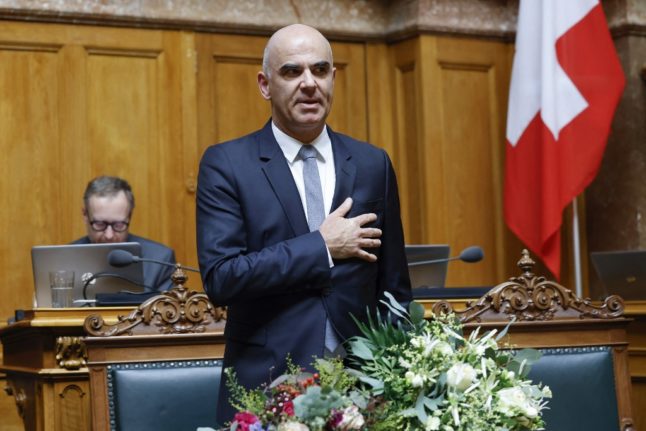KEY POINTS: What changes in Switzerland in January 2023?

New childhood vaccine, changes in traffic rules, and (much) higher costs: this is what's ahead for Switzerland in January 2023.
Switzerland has a new president
Alain Berset, Switzerland’s Health Minister and head of the Federal Department of the Interior, will become the new president on January 1st and remain in this position until December 31st.
Unlike most countries, there is nothing surprising or dramatic about the choice of presidents in Switzerland: each of the seven members of the Federal Council gets a shot at a rotating one-year presidency. And if they stay on the Council for more than seven years, they can become president more than once — as is the case with Berset, who has served on the Council since 2012, and had already been president in 2018.
Also unlike other countries, the Swiss president has virtually no power. Other than representing Switzerland abroad, “he or she chairs the Federal Council meetings and mediates in the case of disputes,” according to the official government site.
In urgent situations, the president can order precautionary measures. In the unlikely event that the Federal Council is unable to hold either an ordinary or an extraordinary meeting, the president may take a unilateral decision” — the latter being the only bit of “power” the president can wield.

Alain Berset is the new president. Photo by STEFAN WERMUTH / AFP
READ MORE: EXPLAINED: Why does Switzerland’s president only serve one year?
Switzerland takes its seat in the UN Security Council
For the first time in history, Switzerland will sit from January 1st on the UN Security Council (UNSC) as one of the 10 non-permanent members.
This unprecedented move for neutral Switzerland “furthers the country's commitment to peace and security within the UN and globally,” according to the government.
Even so, Switzerland’s place on the UNSC has sparked controversy among the right-wing groups who argue that it violates the country’s longstanding policy of non-involvement in foreign affairs.
Most MPs, however, supported the government in the move when they voted in March to back Switzerland’s candidacy, believing the membership in the UNSC will strengthen the country’s international standing.
READ MORE: Why is Switzerland’s UN Security Council bid controversial?
Government issues official recommendation to vaccinate babies against chickenpox
In their updated guidelines for 2023, Swiss health officials are recommending immunising infants against this contagious childhood illness by their first birthday.
"Routine vaccination from early childhood reduces the burden of disease in all age groups. In the medium term, it will also reduce the number of cases of shingles in children and young adults, as well as, in the long term, in older people,” according to the Federal Office of Public Health.
READ MORE: Why Switzerland wants babies to be vaccinated against chickenpox
New tax deductions for childcare
Parents will be able to deduct a larger amount of direct federal tax for child care expenses.
Currently, parents can deduct 10,100 francs from their income for each child cared for outside of home. With the revision of the law on direct federal tax, this ceiling will be increased to 25,000 francs.
New traffic rules will go into effect
From new laws on bicycle lanes and special advantages for carpoolers, to simplified procedure for the introduction of 30-km zones, you will see some new regulations on Swiss roads.
They are detailed in this article:
EXPLAINED: What new traffic rules will go into effect in Switzerland in 2023?
And speaking of driving, don’t forget to affix the new 2023 vignette to your car windshield; you have the whole month of January to do this. If you don’t, and are caught on one of the country’s motorways without one, you will be slapped with a 200-franc fine.
Covid-19 tests will no longer be paid by the government
If you walk into a testing centre and ask for a Covid test after January 1st, you will have to pay for it yourself.
However, if the test is ordered by a doctor, the health insurance will cover the cost, "provided the test is required to determine any further medical action," the Federal Office of Public Health (FOPH) said in a statement.
Covid vaccinations, on the other hand, will remain free of charge.
There are a number of other changes in January as well:
Starting this month, expect to pay higher electricity prices, the exact amount of the increase depending on your canton of residence:
Swiss government confirms ‘sharp increase’ in electricity prices

It will cost more to heat up your house. Photo by Pixabay
But the price shock doesn’t end here: Also starting on January 1st, your monthly health premiums will go up by 6.6 percent on average — the sharpest hike in the past 20 years.
This is the national average; depending on where you live, the increases will be even more substantial, as premiums are set individually by each canton and are based on their health infrastructure, levels of government funding, as well as younger / healthier population versus older, chronically ill residents.
READ MORE: Which Swiss cantons will see the biggest increase in health insurance premiums?
But that’s not all.
Whether you are a tenant or homeowner, expect your rents / mortgage rates to go up as well, due to higher interest rates that were introduced in Switzerland to fight inflation.
This is a summary of what you will have to pay more for in 2023:
Energy, rents, health insurance: How Switzerland will be hit by price rises in 2023
There are some other developments awaiting you as well: some Swiss banks will offer higher interest rates on your savings.
READ MORE: Which Swiss banks offer the highest interest rates on savings?
Comments
See Also
Switzerland has a new president
Alain Berset, Switzerland’s Health Minister and head of the Federal Department of the Interior, will become the new president on January 1st and remain in this position until December 31st.
Unlike most countries, there is nothing surprising or dramatic about the choice of presidents in Switzerland: each of the seven members of the Federal Council gets a shot at a rotating one-year presidency. And if they stay on the Council for more than seven years, they can become president more than once — as is the case with Berset, who has served on the Council since 2012, and had already been president in 2018.
Also unlike other countries, the Swiss president has virtually no power. Other than representing Switzerland abroad, “he or she chairs the Federal Council meetings and mediates in the case of disputes,” according to the official government site.
In urgent situations, the president can order precautionary measures. In the unlikely event that the Federal Council is unable to hold either an ordinary or an extraordinary meeting, the president may take a unilateral decision” — the latter being the only bit of “power” the president can wield.

READ MORE: EXPLAINED: Why does Switzerland’s president only serve one year?
Switzerland takes its seat in the UN Security Council
For the first time in history, Switzerland will sit from January 1st on the UN Security Council (UNSC) as one of the 10 non-permanent members.
This unprecedented move for neutral Switzerland “furthers the country's commitment to peace and security within the UN and globally,” according to the government.
Even so, Switzerland’s place on the UNSC has sparked controversy among the right-wing groups who argue that it violates the country’s longstanding policy of non-involvement in foreign affairs.
Most MPs, however, supported the government in the move when they voted in March to back Switzerland’s candidacy, believing the membership in the UNSC will strengthen the country’s international standing.
READ MORE: Why is Switzerland’s UN Security Council bid controversial?
Government issues official recommendation to vaccinate babies against chickenpox
In their updated guidelines for 2023, Swiss health officials are recommending immunising infants against this contagious childhood illness by their first birthday.
"Routine vaccination from early childhood reduces the burden of disease in all age groups. In the medium term, it will also reduce the number of cases of shingles in children and young adults, as well as, in the long term, in older people,” according to the Federal Office of Public Health.
READ MORE: Why Switzerland wants babies to be vaccinated against chickenpox
New tax deductions for childcare
Parents will be able to deduct a larger amount of direct federal tax for child care expenses.
Currently, parents can deduct 10,100 francs from their income for each child cared for outside of home. With the revision of the law on direct federal tax, this ceiling will be increased to 25,000 francs.
New traffic rules will go into effect
From new laws on bicycle lanes and special advantages for carpoolers, to simplified procedure for the introduction of 30-km zones, you will see some new regulations on Swiss roads.
They are detailed in this article:
EXPLAINED: What new traffic rules will go into effect in Switzerland in 2023?
And speaking of driving, don’t forget to affix the new 2023 vignette to your car windshield; you have the whole month of January to do this. If you don’t, and are caught on one of the country’s motorways without one, you will be slapped with a 200-franc fine.
Covid-19 tests will no longer be paid by the government
If you walk into a testing centre and ask for a Covid test after January 1st, you will have to pay for it yourself.
However, if the test is ordered by a doctor, the health insurance will cover the cost, "provided the test is required to determine any further medical action," the Federal Office of Public Health (FOPH) said in a statement.
Covid vaccinations, on the other hand, will remain free of charge.
There are a number of other changes in January as well:
Starting this month, expect to pay higher electricity prices, the exact amount of the increase depending on your canton of residence:
Swiss government confirms ‘sharp increase’ in electricity prices

It will cost more to heat up your house. Photo by Pixabay
But the price shock doesn’t end here: Also starting on January 1st, your monthly health premiums will go up by 6.6 percent on average — the sharpest hike in the past 20 years.
This is the national average; depending on where you live, the increases will be even more substantial, as premiums are set individually by each canton and are based on their health infrastructure, levels of government funding, as well as younger / healthier population versus older, chronically ill residents.
READ MORE: Which Swiss cantons will see the biggest increase in health insurance premiums?
But that’s not all.
Whether you are a tenant or homeowner, expect your rents / mortgage rates to go up as well, due to higher interest rates that were introduced in Switzerland to fight inflation.
This is a summary of what you will have to pay more for in 2023:
Energy, rents, health insurance: How Switzerland will be hit by price rises in 2023
There are some other developments awaiting you as well: some Swiss banks will offer higher interest rates on your savings.
READ MORE: Which Swiss banks offer the highest interest rates on savings?
Join the conversation in our comments section below. Share your own views and experience and if you have a question or suggestion for our journalists then email us at [email protected].
Please keep comments civil, constructive and on topic – and make sure to read our terms of use before getting involved.
Please log in here to leave a comment.